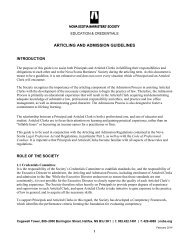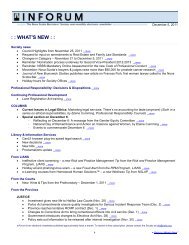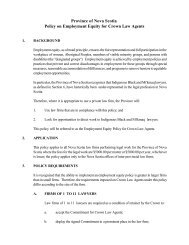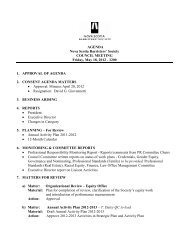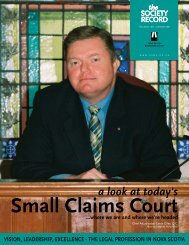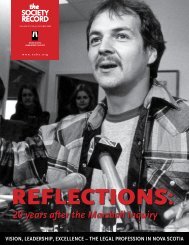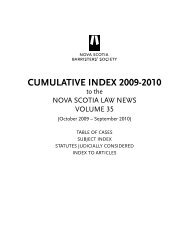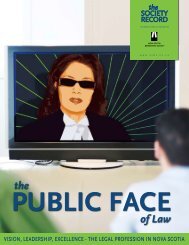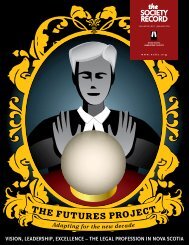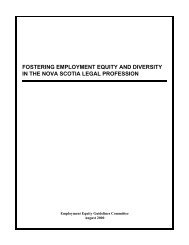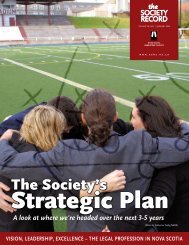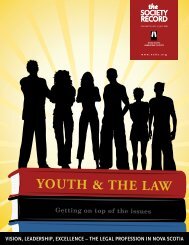SR Vol 24 No 5, October 2006 - Nova Scotia Barristers' Society
SR Vol 24 No 5, October 2006 - Nova Scotia Barristers' Society
SR Vol 24 No 5, October 2006 - Nova Scotia Barristers' Society
- No tags were found...
Create successful ePaper yourself
Turn your PDF publications into a flip-book with our unique Google optimized e-Paper software.
Summationa Question of ValuesLike all of you, growing up I was taught certain moral values,one of which was that if you broke your neighbour’s window,even accidentally, you had a responsibility to fix it or at leastoffer to fix it. Applying this moral value to the personal injury situation,if a member of society gets hurt through somebody else’s negligentactivity, the injured person ought to get completely compensatedby the wrongdoer/tortfeasor. Despite the above, however, wehave somehow ended up with a system where the moral value of thewrongdoer compensating the innocent victim is barely recognized,as manifested by the arbitrary $2,500 cap on pain, suffering and lossof quality of life awards, and as manifested by other features of theinsurance reforms that took effect in <strong>No</strong>va <strong>Scotia</strong> on <strong>No</strong>vember 1,2003 under the Progressive Conservative Party’s watch.These insurance “reforms” to my mind constitute an abrogation of citizens’rights to have their “broken windows fixed”. Although I wouldlike to take credit for this metaphor, I can’t. Originally made by EdLazarus, of the American Trial Lawyers Association State Affairs andLazarus Strategic Solutions, at a continuing legal education conferenceI attended this past July, it struck me as an effective metaphor when attemptingto expose the absurdity and danger of these “reforms”.So are these “reforms” in the public interest? Brian Tabor, Q.C., aBluenoser who was president of the Canadian Bar Association fromAugust 2005 to August <strong>2006</strong>, suggests no. I refer you to an article inthe June <strong>2006</strong> Canadian Bar Association National Magazine wherehe speaks to this as an Access to Justice issue. Other organizations,such as the <strong>No</strong>va <strong>Scotia</strong> Coalition Against <strong>No</strong>-Fault Insurance andthe Atlantic Provinces Trial Lawyers Association (APTLA), also answerthis question in the negative.It is therefore fitting and timely that this issue of the <strong>Society</strong> Record profilesthe impact of these insurance “reforms” - an important part of the<strong>No</strong>va <strong>Scotia</strong> Barrister’s <strong>Society</strong> mandate being to act in the public interest.<strong>No</strong>t only are these insurance reforms a shrinkage of innocent citizens’rights, arguably, they also, implicitly and unfairly, pass a negative judgmenton the evolution of the common law in <strong>No</strong>va <strong>Scotia</strong>. I say unfairlybecause the <strong>No</strong>va <strong>Scotia</strong> judiciary, up until the insurance reforms, to mymind, had done an excellent job of keeping general damage awards andprecedents moderate so as to make the pure tort system affordable andeconomically viable for all of the stakeholders. In the eleven years I practisedplaintiff personal injury law (up until the advent of the reforms)experience had taught me that you had to present credible and compellinglay and expert evidence at trial in order to prove your case and getreasonable compensation. In other words, “run away” or disproportionateawards were at least extremely infrequent, if not non-existent.Our justice system is built on the adversarial model of ascertainingthe truth; a model which the plaintiff and defence bars and triers offact have been ably carrying out in <strong>No</strong>va <strong>Scotia</strong> for almost 250 years.These reforms arguably erode this pillar of our justice system, with nomandate for such erosion.Given these serious ramifications,it therefore behooves usto ask: How did we allow thisto happen? And do we havean obligation to the public toundo what has happened?The former question is less importantthan the latter, thereforeI won’t spend a lot of timetrying to answer it. Suffice itto say some of the answer liesin us taking our previouslyunabridged rights for granted.That fact, combined with apowerful insurance companylobby (with “deep pockets”)which successfully persuadedthe general public and electedSean LaydenBoyne Clarkerepresentatives that innocent victims of motor vehicle negligencewere responsible for both declining insurance profits and rising insurancepremiums, (and that the adversarial model of ascertaining thetruth was also part of the problem) and you’ll see how the insurancecompanies pushed their agenda to both politicians and the public.Question whether the real villains were: a declining return on equityin the stock market for insurance companies, especially, post September11, 2001, and an unrealistic expectation by insurance companieson what their return on equity should be in the first place.Undoing what has happened is where most of the focus should be,which is why I applaud the Barry Masons and the Brian Tabors of theworld. Mason is earnestly pursuing constitutional challenges to thereforms, while Tabor steadfastly and courageously spoke out againstvarious forms of no-fault insurance while he was president of the CanadianBar Association. I also applaud those members of the plaintiffpersonal injury Bar who unflinchingly continue to represent injuredpeople, even though the “reforms” arguably eliminate a significantpart or the tort system, and finally, the <strong>No</strong>va <strong>Scotia</strong> Barristers’ <strong>Society</strong>,who saw this “rights” issue as important enough to be profiled in thisissue of the <strong>Society</strong> Record.Philosophical terms such as justice are usually easier to define in thenegative, as in, I do not necessarily know what justice is, but I knowwhat it is not. It is not the insurance reforms that kicked in on <strong>No</strong>vember1, 2003. Therefore, let us answer the battle cry and moveforward towards a more just <strong>No</strong>va <strong>Scotia</strong> society by undoing whathas been done in the name of “reform”, and level the scales of justice.I want my window fixed when it gets broken. Do you? I will try todo my part. Will you?30 The <strong>Society</strong> Record



